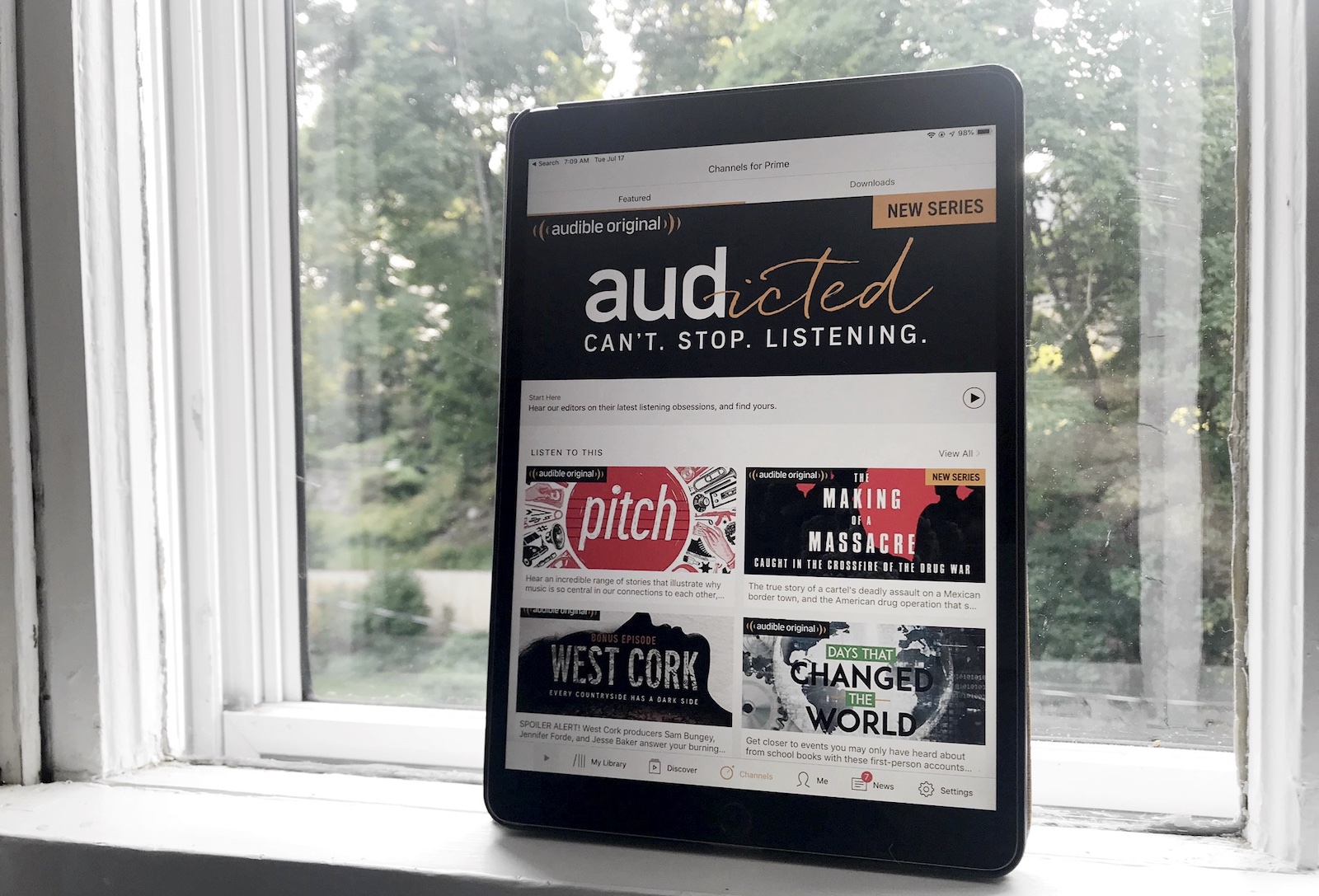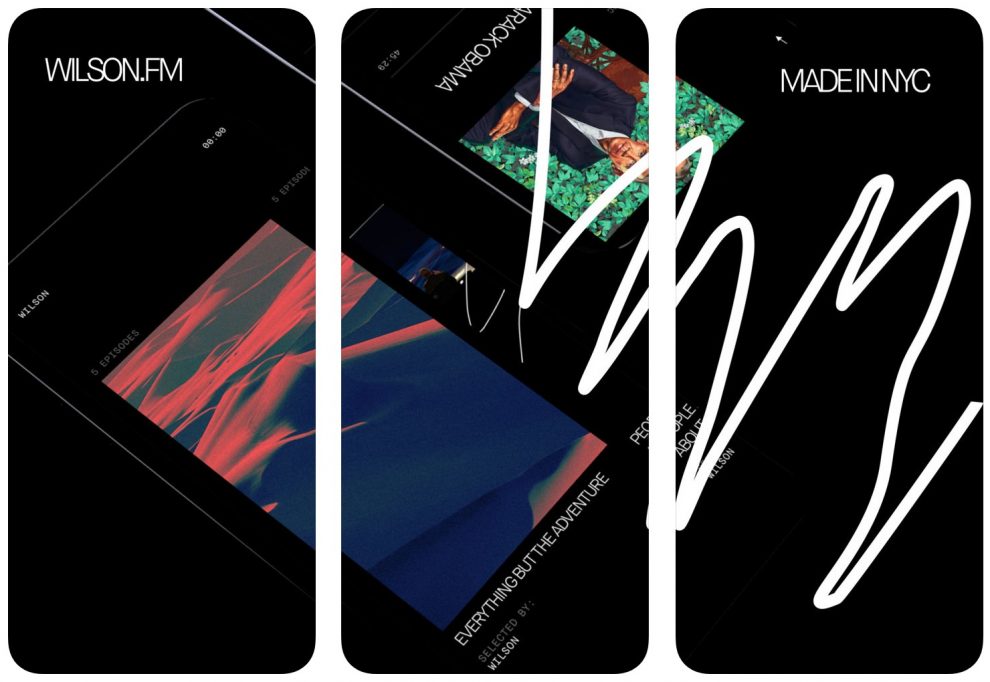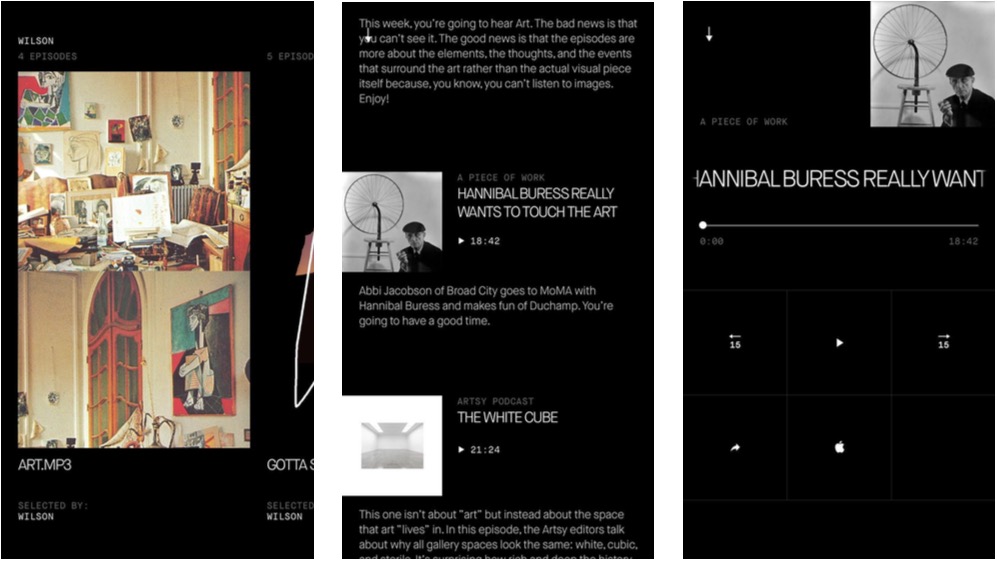
Editor’s note: Hot Pod is a newsletter on the podcasting industry written by Nick Quah; we happily share it with Nieman Lab readers each Tuesday.
Welcome to Hot Pod, a newsletter about podcasts. This is issue 169, published July 17, 2018.
Hey all! Headlining this newsletter with three parallel — but interacting — items on the fun intersection of books and podcasts. Let’s go.
Part One: Audiobook-first. Something peculiar this way comes…from Newark, New Jersey. Back in June, the New York Times reported on a curious development that’s happening at Audible, one that sees the biggest audiobook company in the world investing in audiobook-first products as part of an effort to, as the Times article puts it, “meet growing consumer demand, and also to generate stories that are designed to be listened to rather than read.” In other words, they’re commissioning audiobooks without the hefty book part.
One major expression of this new strategy comes in the form of a multiyear contract with Michael Lewis, the popular nonfiction author of Moneyball and The Big Short fame, which will see Lewis producing four “audio original stories” for Audible. The first of these works, titled The Coming Storm and narrated by Lewis himself, will be published through the Audible platform on July 31.
Relatedly, Lewis is also working on a podcast project with Slate, which is currently scheduled for an early 2019 release.
Audible has long been a horizontal curiosity for the podcast industry, given its hiring of former NPR programming VP Eric Nuzum in mid-2015 and subsequent rollout of the Audible Originals and “Channels” strategy in mid-2016, which saw the company release products that some, like myself, perceived as comparable to and competitive with the kinds of products you’d get from the podcast ecosystem.This signing of authors like Lewis to audiobook-first deals appears to be a ramping up of an alternate original programming strategy, one that sees Audible leaning more heavily into the preexisting nature of its core relationships with the book publishing industry and the book-buying audience. It might also be a consequence of a reshuffle at the executive decision-making level: In late 2017, the Hollywood Reporter broke the news that chief content officer Andrew Gaies and chief revenue officer Will Lopes had unexpectedly stepped down resigned from their posts. (Later reporting noted that the resignations happened in the midst of a harassment probe.) The ripple effects of that sudden shift in leadership is probably only hitting us now, and in this form. I’ll be tracking the extent to this new product line overlaps with or, indeed, ends up superseding what’s been happening with the Channels stuff.
All of this matters, of course, because all of it is related. I believe the way to think about this is to see all audio content providers — from the conventional podcasts of the open ecosystem to everything on Audible to whatever Anchor will become to Headspace plus whatever subscription-first audio platforms come over the horizon to the entire digital music ecosystem — as fighting from the same cochlear real estate. A few weekends ago, I fell behind on podcast listening due to falling into an utter binge-rabbit hole of the audiobook version of John Carreyrou’s Bad Blood, and I daresay I haven’t been able to catch up to my listen list since.
Part Two: Book-adjacent. So that was a story about a big book publishing entity investing in strictly digital products. Next, we have a story about a book publishing entity investing in a strategy that hits both audio and book publishing in tandem.
I’ve written previously about the experiments happening over at Macmillan, where its new Tor Labs imprint had developed a fiction podcast — called Steal the Stars, written by The Message’s Mac Rogers — that was published through the company’s podcast network and was also simultaneously novelized for traditional distribution. I thought it was a really smart idea, noting that it scratches at the idea that different platforms simply serve different consumer slices that may never really overlap. This style of multi-platform execution expands Steal the Stars across a wider surface area and further deepens its ability to financially benefit from a single core creative enterprise. That’s the working theory, anyway.Anyway, Macmillan is coming back for more in this mode of production. The publisher is developing a six-part fiction podcast called The Girls based off an upcoming young adult novel: Courtney Summer’s Sadie — which is, interestingly enough, described to be a “Serial-inspired” young adult thriller, at least according to Bustle. I’m told that the podcast is being designed to stand alone, but that those who consume both the podcast and the book will be treated to different perspectives within the same story-line. Expanded universe, Rashomon-kind of stuff, I suppose.
I asked Kathy Doyle, vice president of podcasting at Macmillan, for some specific detail on how the publisher has viewed the performance of Steal the Stars and other experiments within the company that tie the fates of podcasts and books. She wrote back:
We’re definitely leveraging what we learned with Steal the Stars as we produce for The Girls. In fact, Steal the Stars celebrates its one-year anniversary on Aug. 1 and we’re gearing up for another round of marketing and promotion for the series, which continues to get interest from national media, advertisers, and listeners — that’s the beauty of an evergreen audio drama. The series, to date, has had nearly 1.4 million listens and we’re continuing back-list sales efforts for the Steal the Stars books.
Another strong example of our book-podcast synergy is with our Savvy Psychologist podcast, one of the biggest on our QDT network. We released a book, How to Be Yourself, about social anxiety in March authored by that host, Dr. Ellen Hendriksen, and it went into a second printing. When we review sales data, we see that 50% of sales are for the audio edition, when we might typically see a figure of about 10% for a trade book.
The Girls is set to launch on August 1, with the trailer dropping tomorrow. The novel, Sadie, is scheduled to drop on September 4.
For technical context: Steal the Stars was hosted on Megaphone, while Savvy Psychologist is on Libsyn.
Part Three: Podcast-first. Over at The Wall Street Journal, Ellen Gamerman has a great overview up on the podcast-to-book adaptation trend that’s been picking up lately alongside the podcast-to-film-and-television trend. Aside from listing out several notable projects making the jump, there’s a bit in Gamerman’s piece that provides a nice expression of the risk-ratio factor that I believe is a big part of why we’ve been seeing podcasts heating up as a resource for adaptations:While some books have sparked bidding wars between publishers, the titles don’t tend to carry the high stakes of a Hollywood venture. “If you have 100,000 people listening to a podcast — which is a very modest-sized podcast — and half of them buy the book, the publisher would be thrilled,” said Anthony Mattero, a book agent at Creative Artists Agency (though he noted that publishers will also measure sales against the price of the manuscript).
But the article also offers a peek into a shadow looming over this trend. It’s highlighted in this quote:
With niche podcasts on everything from witches to monster trucks, more publishers are seeing opportunity. “The market for weirdness is untapped,” said Kate Napolitano, a senior editor at Houghton Mifflin Harcourt.
The question: With more resources, attention — and, perhaps most importantly, stakes — flowing into the podcast ecosystem, will its capacity for weirdness be preserved?
The possible campaign on the horizon: Keep Podcasts Weird.
Related: “How ‘The Adventure Zone’ Went From ‘D&D’ Podcast to Graphic Novel.” (The Hollywood Reporter)
Beantown. Last Thursday, The Boston Globe announced that its famed investigative unit Spotlight is working a limited-run podcast series that will explore the complicated story of Aaron Hernandez, the former New England Patriots player who was convicted of murder in 2015 and later committed suicide in prison.
The podcast, which will play out in eight parts, is scheduled to drop in the fall. It comes out of a collaboration with Wondery, which is extending its strategy of partnering up with newspapers to break their investigative projects out into longform, multipart podcast series broadly situated within the true-crime genre. The prime model for this is, of course, Dirty John, Wondery’s successful collaboration with the Los Angeles Times that’s now also heading to television — in two separate forms, no less — and the company has since rolled out a collaboration with the South Florida newspaper Sun-Sentinel. That project is called Felonious Florida.
The Spotlight podcast is The Boston Globe’s second creative partnership on a Boston-oriented podcast. The other is Season Ticket, a daily sports podcast that the Globe developed in collaboration with WBUR. Given the increasingly strong cluster of podcast operations in the city, I’m expecting more Boston-flavored podcasts on the way.
Frontin’. The Interactive Advertising Bureau (IAB) is holding its fourth-annual podcast upfronts September 6 in — where else? — New York City. This year’s venue will be at Convene in midtown Manhattan, marking a departure from the Time Inc. building venue of years past. Slate is slated to keynote, and presenters include Midroll, WNYC, iHeartMedia, and NPR, among others. I’ll probably be there.
Here’s the website for details, and here’s my writeup on the upfront back when I attended in 2016, and here’s my column on the notion of upfronts in podcasting in general. Let’s see what changes and what stays the same.
Smart Audio Report snippets. The latest edition of NPR and Edison Research’s smart speaker report drops tomorrow and, as always, they’re staging a webinar to go through the findings of this year’s survey study.
NPM was kind enough to share some early numbers, if you’re interested in that kind of thing:
Here’s the one I find particularly notable: “Among all smart speaker owners, the most preferred formats for audio advertisements are skills/features created by a brand, host-read ads on podcasts, product endorsements and sponsor or underwriter announcements during public radio.” Furthermore: “81% of all smart speaker owners like/would be open to skills from brands.”
On a related note: This Medium post by GENInnovate’s Freia Nasher has a lot of really good observations, and some nifty ideas: “Hi Alexa, is the monetisation conversation moot?“
Start your engines. Heads up, all you producers in the crowd: The sixth edition of KCRW’s Radio Race is now open for registration. The 24-hour production challenge will take place from 10 a.m. Pacific August 25 through 10 a.m. Pacific August 26. Shouts to last year’s winner, River Rats from Miami (Wilson Sayre and Chris Barr).
And while we’re on the subject of KCRW: The Organist podcast is now back with its fifth season. Rootin’ for you, Mr. Leland.
S-Town lawsuit. The estate of John B. McLemore, the subject of S-Town, is suing the creators of the Peabody-award winning podcast, arguing that they “exploited details of his private life for financial gain,” the Associated Press reports.
The suit was filed in Bibb County, Alabama by the executor of McLemore’s estate, Craig Cargile. It names Serial Productions, This American Life, Chicago Public Media, and host/producer Brian Reed as defendants, among others. Cargile’s attorney told Al.com that the suit “stems from the state’s Right of Publicity Act, which prevents use of voice, name or other characteristics of a person without their permission.”
In an email response to the AP, S-Town executive producer Julie Snyder noted that she could not comment on the suit but says it lacked “merit.”
You can read the suit over here.
Anti. And now for something completely different.
So, there’s this new podcast app-doohickey that came out last week that really caught my eye. It’s called Wilson FM — a name I will forever associate with a volleyball (I’M SORRY, WILSON) — and the thing is billing itself as a “podcast magazine,” which on most days would be a piece of nomenclature that I’d find vaguely annoying. Except that a podcast magazine is exactly what Wilson FM is, and it’s also one of the more pleasurable player ideas I’ve seen in a long while.

The core mechanic isn’t anything particularly revolutionary, other than the fact that it’s remarkably simple. Every week, the app-magazine-thing serves you a new curated playlist of podcast episodes built around a different theme (most of the time). There’s one about art, there’s another about the Supreme Court, and then there’s a collection that’s really just threading together Lea Thau’s Love Hurts series. In other words, it’s a fancy podcast playlist provider, but putting it that way is a little like saying a magazine is a fancy provider of words. I mean, it is, but also, it isn’t, because something has to be said about how a thing feels in the use of it, and man, Wilson FM feels so…different. And as a result, interesting.

Granted, this just might be a situation where I’m responding extra-positively to a drop of water after weeks of drinking nothing but straight-up seltzer. Which is to say: Every podcast app that I’ve used more or less looks and feels the same despite new feature-concepts — say, a social layer — or an expanded suite of bells and whistles. Which as a matter of collective experience generally brings me to place where it’s a little like waking up every morning and relentlessly commuting in a city you once found interesting: After a certain point, you just stop seeing the world around you in new and renewably invigorating ways.
My positivity might also have something to do with how consumer software technology aesthetics seem to be largely situated within a same, sterile place. My buddy Kyle Chayka, a freelance writer who’s currently working on a book about minimalism, dubbed this aesthetic “AirSpace” in an essay for The Verge back in 2016, and you probably already know what he’s talking about: pastels, curved edges, any sharp sense of personality sandpapered away.
In contrast, Wilson FM is weird. Its visual sensibility evokes the new media section of an art school exhibit (or a moderately-sized modern art museum). Its app icon is a funny little scribble. Its squint-to-see-it font has a counterintuitive charm. All these quirks of expression are tied to the fact that the app is primarily the work of one person: Allan Yu, a New York-based designer who’s done stints at Google X, the search giant’s super secret R&D lab, and Svpply, a now-defunct social shopping site that was acquired by eBay in 2012.
“I’ve always had a soft spot for print design and aesthetics that have a point of view or opinion,” Yu tells me over email. “But I’ve been working in tech for quite some time and am just tired of this A/B-tested, data-proven, metric-driven design.” He continues:
I didn’t want to do that when it came to building something that was my own and close to my heart so the only ethos was Anti. The inspiration is Anti-tech, Anti-convention, Anti-UI/UX Design. I looked at a lot of print stuff that mainly contributed to the organization and focus of these Issue covers. Even the proportion of the cover is print-based and I use two typefaces from one of my favorite type foundry, Milieu Grotesque. I also wanted to elevate podcast aesthetics. I don’t understand why a content form with such richness sonically is watered down visually. In some ways, people do judge books by their covers and I wanted to make the covers better, so you’ll give that episode/podcast a chance.
The playlists on Wilson FM are generally built ad hoc, which Yu believes is the best way to do it. He tries to build them with his friends, and he writes the copy in a way that he feels is natural to the way he speaks. Personal touch, individual voice, all that kind of stuff.
In the physical world, Yu is a design consultant/working mercenary, doing gigs to keep things spinning as he builds out Wilson FM. He tells me that he intends to build Wilson FM out into a business. “We want to do it right and our way, which in context of tech businesses today, it means we want to grow it slow,” he told me. “We’re focusing more in the magazine model as we want to mainly be a voice for podcasts within the podcast community.” In this broader pursuit, he has a business partner, Cameron Koczon, who runs an engineering and design studio in Brooklyn.
That Yu hopes to build Wilson FM into a business — that this wasn’t just a side project or exercise — surprised me a little bit. A big part of me reflexively thinks something this specific and idiosyncratic has a hard ceiling that hovers low (*looks at Hot Pod, shudders*), regardless of what business model gets integrated into the app. But then again, a bigger part of me is in this for the specific and idiosyncratic, and someone’s going to figure out how to make that work and grow, then, hell, this is probably just about how you’d start: simply by being genuinely interesting.
Miscellaneous bites: